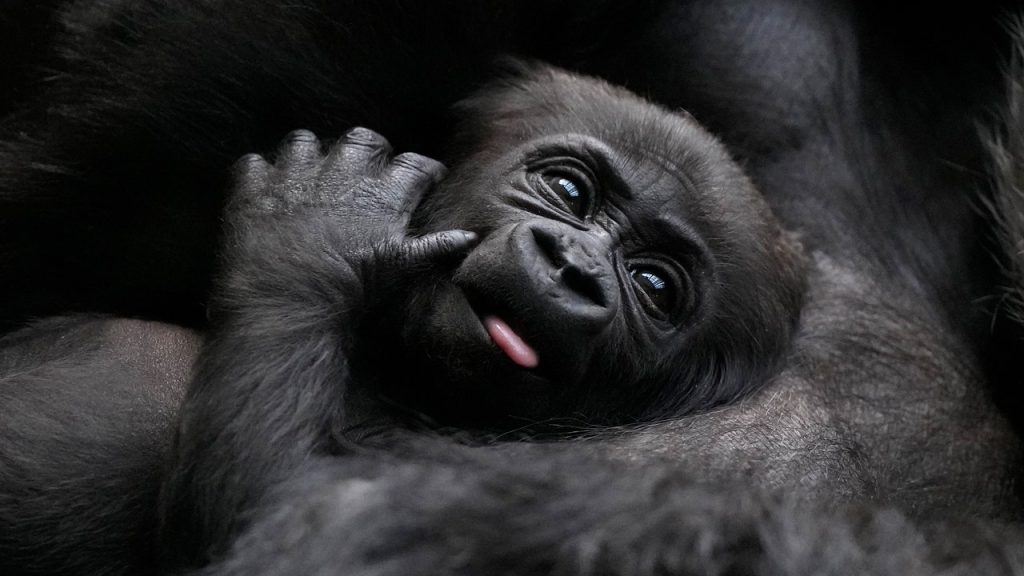The London Zoo recently welcomed a new baby gorilla, born to mother Effie on February 8th. The zookeepers have been unable to determine the baby’s sex as it is constantly held closely by its mother. This new arrival is one of two baby western lowland gorillas born at the zoo this winter, with the other being born to mother Mjukuu almost a month earlier. The babies were sired by Kiburi, a 19-year-old silverback brought to the zoo as part of a conservation breeding program to help preserve the critically endangered gorilla subspecies. The birth of Effie’s baby was not without complications as the baby was born wrapped in its umbilical cord, but thankfully zookeepers were able to assist and ensure the baby’s health and well-being.
The staff at London Zoo have been closely monitoring the newborn gorilla, ensuring that it continues to feed and move around properly. Effie has been a loving and attentive mother, providing the necessary care for her baby. Efforts to determine the baby’s sex have been challenging due to the close bond between mother and child. The zoo plans to leave the baby in Effie’s care as much as possible, allowing her to continue to nurture and protect her young. The newest addition to the zoo is part of ongoing conservation efforts to preserve the critically endangered gorilla subspecies, with Kiburi playing a crucial role in the breeding program.
As part of their commitment to wildlife conservation, London Zoo is set to open a new habitat called The Secret Life of Reptiles and Amphibians to the public. This new exhibit will replace the old Reptile House and provide visitors with an opportunity to learn about and appreciate a variety of reptile and amphibian species. The zoo’s dedication to providing a safe and enriching environment for all its animals, including the newly arrived baby gorillas, underscores their mission to educate the public about the importance of conservation and preservation of endangered species. The zoo continues to be a leader in wildlife conservation efforts, working tirelessly to protect and care for vulnerable wildlife populations.
The birth of the two baby gorillas at London Zoo is a testament to the success of their breeding program and commitment to preserving endangered species. Effie and Mjukuu have both proven to be loving and attentive mothers, ensuring the well-being of their young. The arrival of these babies, sired by Kiburi, highlights the importance of conservation efforts in maintaining genetic diversity and population sustainability among critically endangered species like the western lowland gorilla. The dedication of the zookeepers and staff at London Zoo to the care and protection of these animals is evident in their efforts to ensure the health and safety of the newborn gorillas.
The challenges of determining the sex of the baby gorillas due to their close bond with their mothers highlight the complexities of caring for these animals in captivity. Efforts to provide a natural and stimulating environment for the gorillas, such as the new reptile and amphibian exhibit, demonstrate the zoo’s commitment to enriching the lives of their animals and educating the public about the importance of wildlife conservation. The successful birth and care of the baby gorillas at London Zoo serve as a reminder of the ongoing threats faced by endangered species and the critical need for conservation initiatives to protect and preserve these animals for future generations.
London Zoo’s tireless efforts to support wildlife conservation and protect endangered species through breeding programs and educational initiatives are crucial in ensuring the survival of vulnerable wildlife populations. The arrival of the baby gorillas at the zoo underscores the importance of these efforts and the role that zoos can play in promoting awareness and appreciation of the natural world. By providing a safe and nurturing environment for animals like the baby gorillas, London Zoo continues to make a positive impact on the conservation of endangered species and inspires visitors to join in the fight to protect wildlife and biodiversity around the world.


